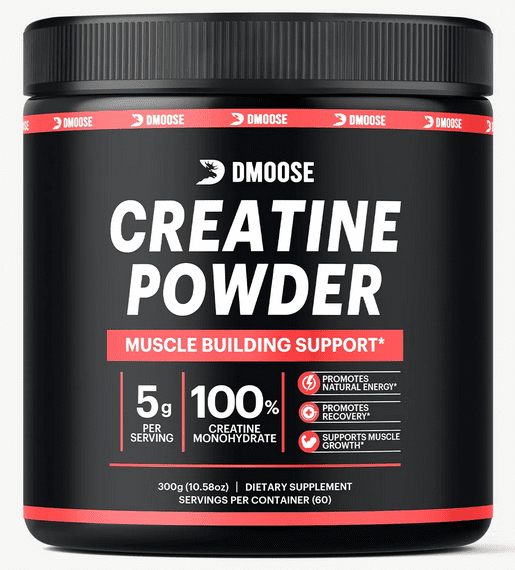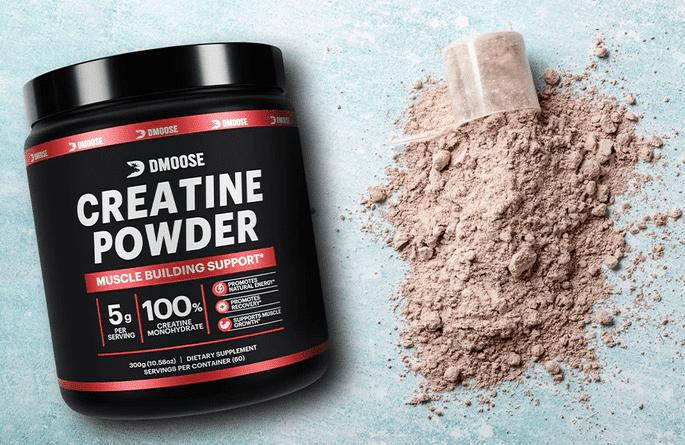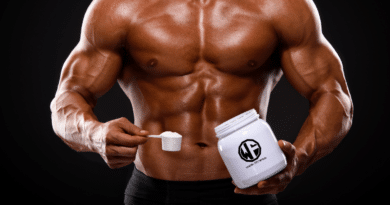What Are the Benefits of Creatine and Should You Take It?
With so many supplements out on the market, it’s challenging to understand what works and what is essentially flushing your money down the drain. Creatine has been around for a very long time and is the most studied supplement on the planet, with over 200 years of data. That said, not everyone understands the benefits of creatine and what it can be used for.
In this article, we will look at the many benefits of creatine and how you should incorporate it into your supplement regimen.
Disclaimer: This article is for informational purposes only and is not meant to treat or diagnose any condition. It is recommended that you speak to your healthcare professional before incorporating any new supplements into your regimen to ensure you are healthy enough to do so and that the supplements will not interfere with any medications or drugs your doctor may have prescribed.

Table of contents
What is Creatine?
There are many benefits of creatine, but what is creatine?
Creatine is a naturally occurring compound found in small amounts in certain foods like red meat and fish, as well as synthesized within the human body. It is primarily stored in muscles and plays a vital role in the production of adenosine triphosphate (ATP), the primary energy source for cellular processes, especially during short bursts of intense physical activity.
Mechanism of Action
Creatine’s mechanism of action revolves around its ability to rapidly regenerate ATP, which is one of the key benefits of creatine. During intense exercise, muscles rely heavily on ATP to fuel contractions. However, ATP stores are quickly depleted. Creatine steps in by donating a phosphate group to adenosine diphosphate (ADP), effectively converting it back into ATP, which can then be used for energy again. This process is particularly beneficial during activities that involve short, high-intensity bursts of effort, such as weightlifting, sprinting, and jumping.

The Benefits of Creatine
Creatine has been deemed safe to use and has many advantages that span across several categories.
Related Article: Creatine for Women — What’s the Most Effective Type?
Below is a list of many benefits of creatine that you can achieve through its consistent use as part of your supplement regimen.
1. Build Muscle
The most highly sought-after of all the benefits of creatine is, by far, its ability to help build muscle and speed up the rate at which lean muscle can experience growth.
A study looked at the benefits of creatine when it came to users versus non-users and found that those who utilized creatine added, on average, around 4.4 pounds more lean muscle mass than the group that didn’t supplement with creatine over a 6-week timeframe.
2. Increase Strength
In order to build lean muscle mass, you need to be able to progressively overload the muscle, which requires an increase in strength. It just so happens that research has identified an increase in strength as being one of the benefits of creatine.
Related Article: What Happens If You Miss Taking Your Daily Creatine Dose?
If you want to take your workouts to the next level and add some extra plates onto your lifts, creatine could punch your ticket to improve strength and muscle size.
3. Boost Energy
During workouts, your body requires energy in order to function properly. This source of energy comes in the form of ATP (adenosine triphosphate). When engaged in a workout, your body breaks down ATP to be used as energy. Your ability to resynthesize and replenish ATP levels will determine how long your energy remains heightened during workouts.
One of the benefits of creatine is that it can help the muscle cells produce more energy by helping replenish ATP and phosphocreatine stores in the body. In doing so, it can help you push longer and harder during training sessions.

4. Enhance Performance
Piggybacking off the benefits of creatine mentioned above, supplementing with creatine has been shown to enhance performance by as much as 15%.
What this means to the avid workout enthusiast is that they can recover faster, minimize fatigue, boost muscle endurance, increase strength and power, and ultimately get more out of their training session.
5. Improve Brain Health
While muscle growth is a focal point as being one of the main benefits of creatine, there are some cognitive benefits as well. Your brain requires ATP, just like your muscles, in order to function optimally. By supplementing with creatine, you can boost phosphocreatine levels, which also replenishes ATP levels in the brain, increasing mitochondrial function and dopamine levels.
Creatine can also help improve your ability to recall information and enhance memory.
6. Clinical Applications
Another of the benefits of creatine is that it’s been shown promise in certain medical conditions, such as neurodegenerative diseases and muscle-wasting conditions, where maintaining muscle mass and function is crucial.
Different Forms and the Benefits of Creatine Types
There are several forms of creatine you should be aware of. Below are the various types as well as the benefits of creatine according to the specific form.
Creatine Monohydrate
This is the most well-researched and commonly used form of creatine. It is simple and effective, with a high absorption rate. It’s available in powder and capsule forms.
Creatine Ethyl Ester
This form was developed to improve creatine’s absorption. However, research on its efficacy is limited, and it may not provide significant advantages over monohydrate.
Creatine HCl (Hydrochloride)
Similar to ethyl ester, creatine HCl aims to enhance absorption. It’s often touted as being easier on the stomach, but more research is needed to establish its superiority.
Buffered Creatine
This form is combined with alkaline compounds to supposedly increase stability and reduce stomach discomfort. However, evidence supporting its benefits is limited.
How to Take Creatine
There are many schools of thought on how to take creatine. One method is to load creatine at 20 grams daily for a week and then reduce it to a maintenance of 5 grams every day following to quickly hyper-saturate the muscle with creatine. Unfortunately, many people experience bloating and gastrointestinal issues during the week they are loading creatine.
Related Article: Creatine Monohydrate 101: The Research Behind a Phenomenon
The good news is that research has found it’s unnecessary to load creatine. One of the benefits of creatine is that it has a compounding effect. Therefore, you can take a maintenance dose of 5 grams per day (every day), and after 30 days, your muscles will still be fully saturated with adequate amounts of creatine without having to go through a loading phase.
You Can’t Go Wrong with the Benefits of Creatine
One of the benefits of creatine (especially creatine monohydrate) is that it’s incredibly affordable, and being that it’s a single-ingredient supplement, they are pretty much all the same across every brand. That said, you should not only look for a quality brand you can trust but also look for creatine at a good price.
Related Article: The Best Creatine on Amazon
DMOOSE has an incredibly high-quality 100% creatine powder that is dosed conveniently at the recommended maintenance of 5 grams per serving. If you want to get the best bang for your buck, check out DMOOSE Creatine Powder and provide yourself the opportunity to take advantage of all the benefits of creatine.
*This article was sponsored by DMOOSE.


*Disclosure: This article may contain affiliate links or ads, which means we earn a small commission at no extra cost to you if you make a purchase through these links. These commissions help support the operation and maintenance of our website, allowing us to continue producing free valuable content. Your support is genuinely appreciated, whether you choose to use our links or not. Thank you for being a part of our community and enjoying our content.
PLEASE CONSIDER SHARING THIS ON YOUR SOCIAL MEDIA TO HELP OTHERS LEARN MORE ABOUT THIS TOPIC.





